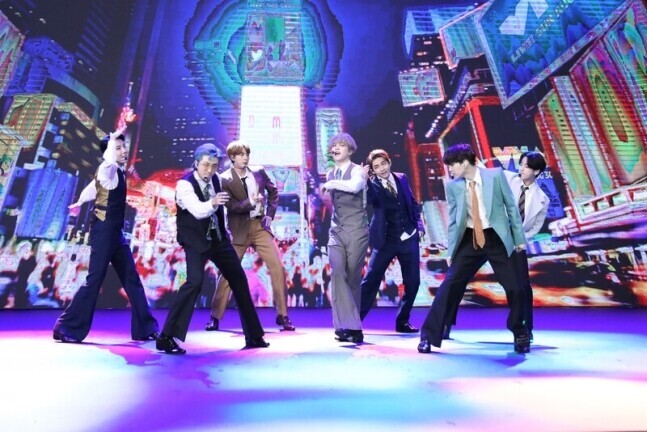hankyoreh
Links to other country sites 다른 나라 사이트 링크
Should BTS be exempted from military service?

The leadership of South Korea’s ruling Democratic Party has suggested that figures in pop culture and art — such as the wildly popular K-pop group BTS — should be exempted from mandatory military service if they have helped boost the national prestige. This argument was made when the Korean Wave, also known as Hallyu, moved beyond Asia and into Europe and the Americas, but it has faced stiff pushback from Korean men who have completed their military service and also prompted questions about fairness. But now that BTS has become a worldwide sensation, even reaching the top spot on the Billboard singles chart in the US, the home of pop music, there are signs that public opinion is changing, leading politicians to call for a revision to the law.
Noh Woong-rae, a member of the Democratic Party’s supreme council, brought up the idea during a council meeting on Oct. 5. “In a short time, BTS has brought the country 1.7 trillion won [US$1.46 billion] worth of [economic] benefits. The value of the group’s contribution to spreading the Korean Wave and elevating the national prestige can’t even be estimated. It’s time we had a serious discussion about exempting BTS from military service,” Noh said.
“Currently, there are alternative service programs available for industrial technicians, professional researchers, artists, and athletes, but those aren’t open to popular artists such as the BTS members. If there are concerns about objectivity and fairness, decisions [about giving exemptions from military service] could be made by a public cultural and arts panel composed of several experts,” Noh emphasized.
“In a time of convergence when it’s difficult to distinguish between high art and popular art, leaving figures from popular arts and culture out of military service exemptions may itself be a form of discrimination. In connection with that, we’re working on a revision to the Military Service Act,” Noh told the Hankyoreh over the phone.
Jeon Yong-gi, a lawmaker with the Democratic Party, has submitted a bill to the National Assembly that would allow top practitioners of popular arts and culture to delay their enrollment in the military until the age of 30. Under the current Military Service Act, that kind of delay is only available to undergraduate and graduate students, researchers, and outstanding athletes. The bill that Noh is preparing would go one step further by providing an exemption from military service. But another member of the party expressed skepticism, noting that “a consensus hasn’t formed inside the party about exempting figures in popular arts and culture from military service.”
Even if it were submitted to the National Assembly, any revision to the Military Service Act faces considerable hurdles before it becomes law. Military service is a sensitive issue for the younger generation, given its ties to fairness, making politicians reluctant to jump on the bandwagon. Nor would it be easy to devise standards for applying such an exemption. While athletes can be deemed eligible based on medals earned in the Olympics or the Asian Games, it’s less obvious what the standards would be for popular artists.
The BTS management company believes that Jin, the oldest member of the group, can delay his enrollment in the military until 2021 since he’s currently attending graduate school.
By Jung Hwan-bong, staff reporter
Please direct comments or questions to [english@hani.co.kr]

Editorial・opinion
![[Column] Season 2 of special prosecutor probe may be coming to Korea soon [Column] Season 2 of special prosecutor probe may be coming to Korea soon](https://flexible.img.hani.co.kr/flexible/normal/500/300/imgdb/original/2024/0426/3317141030699447.jpg) [Column] Season 2 of special prosecutor probe may be coming to Korea soon
[Column] Season 2 of special prosecutor probe may be coming to Korea soon![[Column] Park Geun-hye déjà vu in Yoon Suk-yeol [Column] Park Geun-hye déjà vu in Yoon Suk-yeol](https://flexible.img.hani.co.kr/flexible/normal/500/300/imgdb/original/2024/0424/651713945113788.jpg) [Column] Park Geun-hye déjà vu in Yoon Suk-yeol
[Column] Park Geun-hye déjà vu in Yoon Suk-yeol- [Editorial] New weight of N. Korea’s nuclear threats makes dialogue all the more urgent
- [Guest essay] The real reason Korea’s new right wants to dub Rhee a founding father
- [Column] ‘Choson’: Is it time we start referring to N. Korea in its own terms?
- [Editorial] Japan’s rewriting of history with Korea has gone too far
- [Column] The president’s questionable capacity for dialogue
- [Column] Are chaebol firms just pizza pies for families to divvy up as they please?
- [Column] Has Korea, too, crossed the Rubicon on China?
- [Correspondent’s column] In Japan’s alliance with US, echoes of its past alliances with UK
Most viewed articles
- 1‘We must say no’: Seoul defense chief on Korean, USFK involvement in hypothetical Taiwan crisis
- 2Why Kim Jong-un is scrapping the term ‘Day of the Sun’ and toning down fanfare for predecessors
- 3After election rout, Yoon’s left with 3 choices for dealing with the opposition
- 4Two factors that’ll decide if Korea’s economy keeps on its upward trend
- 5BTS says it wants to continue to “speak out against anti-Asian hate”
- 6Gangnam murderer says he killed “because women have always ignored me”
- 7South Korea officially an aged society just 17 years after becoming aging society
- 8[Column] Park Geun-hye déjà vu in Yoon Suk-yeol
- 9Division commander ordered troops to enter raging flood waters before Marine died, survivor says
- 10No good, very bad game for Korea puts it out of Olympics for first time since 1988